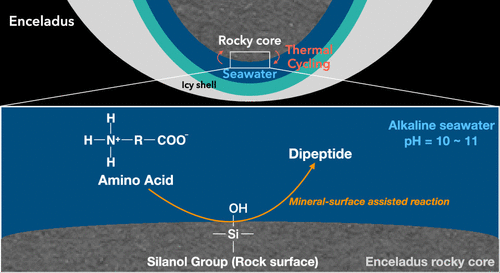当前位置:
X-MOL 学术
›
ACS Earth Space Chem.
›
论文详情
Our official English website, www.x-mol.net, welcomes your
feedback! (Note: you will need to create a separate account there.)
Peptide Synthesis under the Alkaline Hydrothermal Conditions on Enceladus
ACS Earth and Space Chemistry ( IF 2.9 ) Pub Date : 2019-10-25 , DOI: 10.1021/acsearthspacechem.9b00108 Wataru Takahagi 1, 2, 3 , Kaito Seo 1, 3, 4 , Takazo Shibuya 1 , Yoshinori Takano 3, 5 , Kosuke Fujishima 4, 6 , Masafumi Saitoh 7 , Shigeru Shimamura 1 , Yohei Matsui 8 , Masaru Tomita 3, 4 , Ken Takai 1
ACS Earth and Space Chemistry ( IF 2.9 ) Pub Date : 2019-10-25 , DOI: 10.1021/acsearthspacechem.9b00108 Wataru Takahagi 1, 2, 3 , Kaito Seo 1, 3, 4 , Takazo Shibuya 1 , Yoshinori Takano 3, 5 , Kosuke Fujishima 4, 6 , Masafumi Saitoh 7 , Shigeru Shimamura 1 , Yohei Matsui 8 , Masaru Tomita 3, 4 , Ken Takai 1
Affiliation

|
Chemical evolution is an abiotic reaction process in which complex organic molecules arise from a combination of simple inorganic and organic chemical compounds. To assess the possible ongoing chemical evolution in the subsurface ocean of Saturn’s icy satellite Enceladus, we explored the water–rock aqueous reactions and the peptide formation capability under a hydrothermal environment similar to that on Enceladus. It has been suggested that the core of Enceladus has not experienced high temperatures from the time of satellite formation to the present. The major components of the core are assumed to be carbonaceous chondrites; thus, simple organic substances, including amino acids, are likely present in the alkaline seawater of Enceladus. In this study, we conducted a laboratory-based simulation experiment to describe the chemical alteration of six prebiotically abundant amino acids over 147 days under high pressure with thermal cycling (30 to 100 °C) to simulate the water–rock interface of the ocean on Enceladus. As a result, we detected 28 out of 36 possible dipeptide species during the entire reaction period. We propose that peptide-bond formation is coupled to rock surface chemisorption of amino acids under alkaline condition, which was further supported by the elemental analysis showing carbon and nitrogen signature on the rock surface only when amino acids are added. The above result suggests that ongoing chemical evolution on Enceladus is likely producing short abiotic peptides on the porous core surface.
中文翻译:

土生的碱性水热条件下肽的合成
化学演化是一种非生物反应过程,其中复杂的有机分子由简单的无机和有机化合物的组合产生。为了评估土星冰冷的土卫二土卫二在地下海洋中可能正在进行的化学演化,我们探索了与土卫二类似的水热环境下的水-岩水反应和肽形成能力。有人提出,从卫星形成之时到现在,土卫二的核心都没有经历过高温。岩心的主要成分被认为是碳质球粒陨石。因此,土卫二的碱性海水中可能存在简单的有机物质,包括氨基酸。在这项研究中,我们进行了一项基于实验室的模拟实验,描述了高压下147天热循环(30至100°C)中6种益生元丰富的氨基酸的化学变化,以模拟土卫二上海洋的水-岩石界面。结果,在整个反应期间,我们检测到36种可能的二肽物种中的28种。我们提出,在碱性条件下,肽键的形成与氨基酸的岩石表面化学吸附有关,这仅受元素分析的支持,元素分析表明,仅当添加氨基酸时,岩石表面的碳和氮签名。上述结果表明,在土卫二上正在进行的化学演化很可能在多孔核表面上产生短的非生物肽。
更新日期:2019-10-25
中文翻译:

土生的碱性水热条件下肽的合成
化学演化是一种非生物反应过程,其中复杂的有机分子由简单的无机和有机化合物的组合产生。为了评估土星冰冷的土卫二土卫二在地下海洋中可能正在进行的化学演化,我们探索了与土卫二类似的水热环境下的水-岩水反应和肽形成能力。有人提出,从卫星形成之时到现在,土卫二的核心都没有经历过高温。岩心的主要成分被认为是碳质球粒陨石。因此,土卫二的碱性海水中可能存在简单的有机物质,包括氨基酸。在这项研究中,我们进行了一项基于实验室的模拟实验,描述了高压下147天热循环(30至100°C)中6种益生元丰富的氨基酸的化学变化,以模拟土卫二上海洋的水-岩石界面。结果,在整个反应期间,我们检测到36种可能的二肽物种中的28种。我们提出,在碱性条件下,肽键的形成与氨基酸的岩石表面化学吸附有关,这仅受元素分析的支持,元素分析表明,仅当添加氨基酸时,岩石表面的碳和氮签名。上述结果表明,在土卫二上正在进行的化学演化很可能在多孔核表面上产生短的非生物肽。











































 京公网安备 11010802027423号
京公网安备 11010802027423号